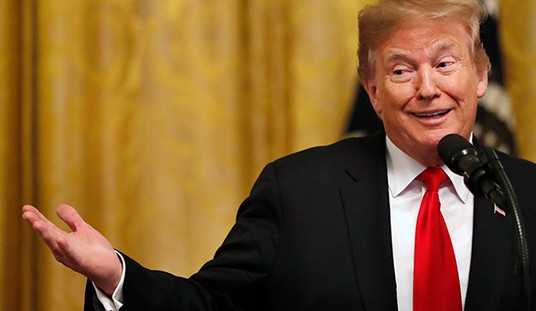What can I say? That Katharine Weymouth, publisher and CEO of the Washington Post, was shocked, shocked to discover that her marketing department was selling places to a series of “intimate and exclusive” political salons at her house? Or, rather, was she shocked and dismayed to discover that her marketing department had been discovered selling the spots?
Personally, I have a grudging admiration for the brass of Charles Pelton, the Post executive who came up with the idea. “Bring your organization’s CEO or executive director literally to the table,” one of his fliers advised.
“Interact with key Obama Administration and Congressional leaders . . . Spirited? Yes. Confrontational? No. The relaxed setting in the home of Katharine Weymouth assures it.”
The cost? $25,000 to “sponsor” one event (Maximum of two sponsors per “intimate and exclusive” event). Or get a bulk deal on all eleven: only $250,000 for the lot. The Washington Post, incidentally, lost $19.5 million last quarter.
The blogosphere naturally had a field day with the story. Every place from the Daily Kos to The Weekly Standard reacted with disgust (tempered, in many cases, with a dollop of humor: The Weekly Standard reports this “Twitter of the Day”: “i heard joe biden tried to pay the Post $25k to have access to the obama administration”).
My unofficial survey suggests that the word “pimp” has not made so many public appearances since the days of the Mayflower Madam. Once the egg had been thoroughly distributed across the collective countenance of The Washington Post, it was simply business as usual for Ms. Weymouth to step on to her oversized mare to express sorrow, disappointment, surprise (shock, shock, remember?) that such a thing could be going on at her newspaper. “Absolutely, I’m disappointed,” she said.
“This should never have happened. The fliers got out and weren’t vetted. They didn’t represent at all what we were attempting to do. We’re not going to do any dinners that would impugn the integrity of the newsroom.”
Marcus Brauchli, executive editor of the Post, got on to a horse of his to iterate this deep concern about journalistic integrity. Ms. Weymouth was “disappointed,” but Brauchli confessed himself positively “appalled” by the idea. “It suggests that access to Washington Post journalists was available for purchase,” he said, underlining the obvious.
So what do you think? What if the fliers hadn’t gone public: would the salons have proceeded as planned? How much of Ms. Weymouth’s disappointment and Mr. Brauchli’s feelings of being “appalled” are due to the squamous light of publicity, not to say ridicule?I don’t know the answer to that question. But here’s another: were you surprised when you read that the mighty Washington Post was offering lobbyists access to senior Obama administration officials in exchange for a hefty pile of shekels? Or did you react as I did, with a snort of contempt and the muttered exclamation: “it figures”?
Quite a few people, I reckon, had precisely that reaction. And whether it accurately reflects what went on at The Washington Post is of only incidental concern. What matters is the increasingly low opinion the public has of the legacy, formerly the “mainstream,” media. At a moment when a major television network chooses to act as a satellite branch of the Obama administration’s press office, why should we be surprised if a major newspaper endeavors to arranges liaisons between lobbyists and the favorite-ever administration?
The only thing more obvious than the intellectual and moral bankruptcy of the legacy media is its breathtaking arrogance. Last night, I went to a debate between the French writer Guy Sorman and self-celebrated New York Times foreign correspondent Roger Cohen. The ostensible subject of the debate was Mr. Sorman’s new book Economics Does Not Lie: A Defense of the Free Market in a Time of Crisis . I had a special interest, since I am the book’s publisher. It was an illuminating evening.
But the illumination only intermittently had to do with Mr. Sorman’s ideas. Chiefly, it shone upon Mr. Cohen, who clearly hadn’t read the book, could barely get three sentences out without expressing his contempt for George W. Bush, his love for Barack Obama, and his conviction that the Untied States really wasn’t up to his high standards of what a country should be. (I thank God, he said at one point, that my children were not born in this country.) It was among the more irritating performances I have witnessed. Mr. Sorman, I must say, acted with a forbearance I can only describe as saintly. When Roger Cohen compared “the world according to Guy Sorman” to partly-post-totalitarian regimes like China, Russia, and Iran where (according to him) capitalist greed runs rough-shod over the rights of ordinary citizens, Mr. Sorman patiently explained some virtues of the free market.
Perhaps the most amazing moment, however, came when Roger Cohen asked if Guy Sorman thought it would be desirable if The New York Times were to disappear. This was a New York audience, so you will not be surprised to learn that the eruption of applause was limited to one person, namely me. What I found extraordinary, though — beyond the delicious contemplation of a New-York-Times-less world — was the full-sailed arrogance of Roger Cohen who clearly believed that an allegiance to and unstinting admiration for the great New York Times was a litmus test of moral and political probity. He provided the audience with a brief précis of some of the Times‘s recent financial difficulties and clearly thought that we should regard this as a sort of national emergency: My God, The New York Times is in trouble! Somebody do something! I thought about Mr. Cohen’s performance this morning when I read about the travails of The Washington Post. It’s a little sad, really — what a load of puffed up self-righteousness it elicited! — but chiefly it’s a comic drama playing to an increasingly empty theater. Which is why the real story has as much to do with journalistic irrelevance as journalistic integrity.









Join the conversation as a VIP Member